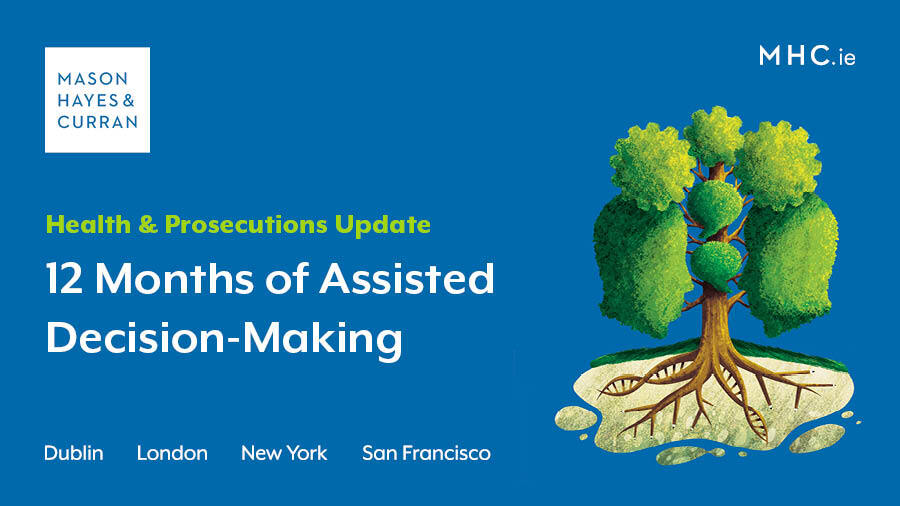12 Months of Assisted Decision-Making
A milestone of progress or a year of challenges?

One year on from the introduction of assisted decision-making laws, our Health & Prosecutions team reviews the consequences and practical implications for healthcare providers, clinicians and those working with vulnerable adults.
The date of commencement of the Assisted Decision-Making Act, 26 April 2023, marked a radical transformation for capacity law in Ireland. The abolition of the wardship jurisdiction, and its replacement with various decision supports, was long overdue. However, one year on from the introduction of this new law, some challenges with the implementation of the new regime are emerging.
Decision supports
Under the new Act, a person who currently requires decision support can avail of a three-tier system of assisted decision-making:
- Decision-Making Assistance
- Co-Decision-Maker
- Decision-Making Representative
There are also two further types of decision-support provided for in the Act, to take effect at a future date in the event of incapacity, namely:
- Advance Healthcare Directives
- Enduring Powers of Attorney
Challenges
Some of the challenges emerging are inevitable, given the introduction of a significant piece of legislation which created a new jurisdiction in the Circuit Court. Judges, court staff and lawyers alike are grappling with new applications, new guidelines, and new forms. Despite these factors, however, there is still a clear dedication to progressing cases. It is vital that practices and outcomes are consistent across the country.
A significant cohort of cases involving vulnerable adults, which would previously have been dealt with under the wardship jurisdiction, cannot be dealt with adequately or appropriately under the new Act. This leaves healthcare professionals with no option but to make applications under the High Court’s inherent jurisdiction.
Very serious issues of concern are arising from the new system for Enduring Powers of Attorney (EPA). In particular, these not only relate to the practicalities of creating an EPA, but also to the specifics of the EPA provisions contained in the new Act. For example, notice of the creation of an EPA by an individual must be given to the spouse and adult children of the individual, regardless of any family dynamics. There is a real risk that these issues will, in time, have implications for healthcare providers, financial institutions and other organisations. This is because the EPA provisions may deter, or cause reluctance, among individuals to make provisions for future decision supports, which could ultimately result in unnecessary court applications.
Wards of Court
All existing Wards of Court must be discharged from wardship by 26 April 2026 at the latest, although any Wards who continue to require decision support can avail of the appropriate support tier, following a court application.
Comment
Given that the new Act is still in its infancy, and given some of the issues previously mentioned, the law and practice in this area will undoubtedly evolve in the years to come.
If you require advice about any aspect of the new Act, from compliance and training to urgent court applications, please contact a member of our Health & Prosecutions team.
The content of this article is provided for information purposes only and does not constitute legal or other advice.
Share this:



